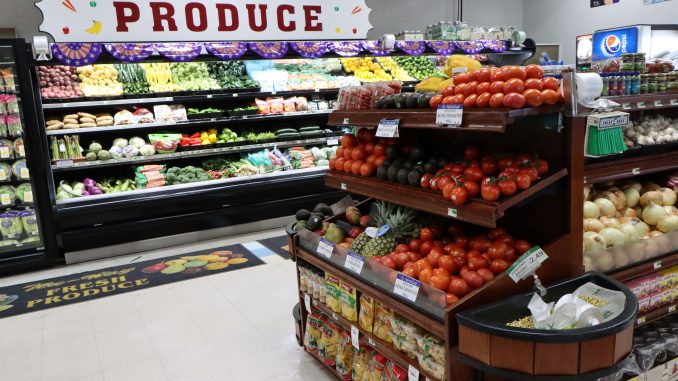
What happens to excess food from grocery stores after it reaches its expiration date?
Most grocers regularly rotate their stock to remove expired food products from their inventory. And the food industry widely acknowledges that returning unwanted goods to their original vendors is an effective strategy for managing discarded and expired food.
In contrast, the owners of Nu-Way Market—Beau Perkins, and Bill Patchen, who have been operating the store since 2004—use a more socially conscious approach to handling food waste.
“We work with the Spirit of Life Church to donate our non-perishable overstock or closeout food items to needy Tehama County residents,” says Nu-Way Market manager Beau Perkins, “and we give our produce trimmings to local farmers.”
For 20 years, Nu-Way Market has also collaborated with the Los Molinos and Cone Community United Methodist Churches to administer the Food for the Hungry Program. Overall, local churches help provide food to disadvantaged families in the Los Molinos, Tehama, Gerber and Vina regions. This partnership addresses the incidence of food insecurity primarily in Tehama County, while curbing landfill food waste and reducing the negative impacts of climate change.
“We do what we can to help (Tehama County) residents by raising revenue to purchase library books, fund high school senior scholarships, and help families,” says Perkins.
In addition to food donations to local churches, Nu-Way Market typically donates eight to 10 boxes of food waste products each week to Tehama County farmers. For nearly two decades, in fact, Nu-Way Market has provided produce to local farms, which reduces farmers’ feed expenses.
“We are just giving back to the community; everyone is helping each other,” Perkins says.
It’s also helping the environment—and the landfills. The United States Department of Agriculture estimates that approximately 31% or 133 billion pounds of food is wasted by Americans annually. This means that much of the food produced globally goes to waste and is transferred to a landfill. Food waste in landfills generates methane, a greenhouse gas that is 84 times more potent than carbon dioxide over a 20-year period.
Nu-Way Market and its partners work diligently to supply food to underserved families in Los Molinos communities. This results in decreased food waste sent to landfills and reduced greenhouse gas emissions that contribute to air pollution.
“…we encourage all Los Molinos small businesses to partner with us to address climate change by reducing food waste and building (sustainable) food systems for current and future generations,” says Perkins.

For more information on SB 1383 and how it will affect Tehama County residents, visit www.tehamacountylandfill.com. This article was funded by a grant from CalRecycle.

